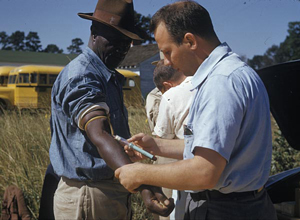New spring course expected to appeal to students interested in public health practice in our region
November 24, 2008
From malaria and yellow fever to HIV/AIDS, the public health history of the American South has been a continuing story of disease and pestilence for 300-plus years.
Include widespread environment degradation for most of the past century and you have the foundations for a new university course: "Southern Discomfort: Public Health in the American South."

Mindi Spencer
Dr. Mindi Spencer will teach the course to be offered in the spring. She is an assistant professor in the Arnold School’s Department of Health Promotion, Education, and Behavior with a joint appointment in the USC Institute for Southern Studies.
Spencer says Southern Discomfort will be helpful to public health students because so many are Southerners, “interested in staying in the South and hoping to improve the communities in which they’ve grown.”
Spencer closely fits that description herself. A West Virginia native, she earned a doctorate in Life-Span Developmental Psychology from West Virginia University. She joined the Arnold School faculty in August.
Spencer has split the course into three units, each covering a different aspect of health in the South.
The sections include an examination of historical endemic diseases, health disparities in the American South, and current public health issues.
Spencer says the endemic diseases include malaria, yellow fever and hookworm, scourges noted in South Carolina beginning with the settlement of Charleston in 1670.
At other times Southerners fell victim to smallpox, measles, chicken pox, typhus, typhoid fever, dysentery, scarlet fever, diphtheria, and cholera.
The class will take a close look at pellagra, a widespread disease that reportedly killed 1,306 South Carolinians during the first ten months of 1915.
 U.S. Public Health researcher Dr. Joseph Goldberger was the first to establish a link between the disease and diet. Ultimately, scientists established that the disease was caused by a deficiency of niacin, a form of vitamin B.
U.S. Public Health researcher Dr. Joseph Goldberger was the first to establish a link between the disease and diet. Ultimately, scientists established that the disease was caused by a deficiency of niacin, a form of vitamin B.
Spencer said Goldberger was generally viewed as a hero for his research, but the class will examine the ethics of his decision to test his theories by introducing the disease to Mississippi prison inmates. She will also use Goldberger’s work as a way to teach students about the principles of the scientific method.
Pelegra was the most serious malady, but other diet related illnesses such as goiter, afflicted millions of impoverished sharecroppers, millworks and tenant farmers. For those unfortunates, most meals consisted of the ''three-M diet'': meat (usually pork fatback); molasses (sometimes sorghum syrup); and meal (cornmeal).
Also receiving special attention will be the Tuskegee Study, a project of the U.S. Public Health Service conducted between 1932 and 1972 in Tuskegee, Alabama.
Before a leak to the press halted the project, public health researchers followed 399 African-American sharecroppers suffering from syphilis to observe the natural progression of the disease if left untreated.
|
A U.S. Public Health Service technician draws blood from one of the Tuskegee syphilis study participants. (Photo from National Archives) |
Spencer said the fallout from that study lingers today. Many African-Americans are distrustful of medical research, making it difficult to enroll African Americans in clinical trials.
Selected readings in the course include:
- Disease and Distinctiveness in the American South by medical historians Todd Savitt and James Young. The first book to discuss southern health problems of the past and ask whether the diseases endemic to the region may not have been an important but somewhat neglected factor in the continuing debate over southern distinctiveness.
- Dying in the City of the Blues by Rutgers University historian Keith Wailoo. Set in Memphis, the book traces the history of sickle cell anemia in the U.S. from a little noticed malady to widespread symbol of African-American pain and suffering.
- Dumping In Dixie: Race, Class, And Environmental Quality by University of California sociologist Robert D. Bullard. The book looks at the issue of dumping waste in rural areas of the South where the population is comprised of low-income whites and Africa-Americans. The book notes that landfills in five southern states -- Alabama, Louisiana, Oklahoma, South Carolina, and Texas – account for nearly 60 percent of the nation's total hazardous-waste landfill capacity.
- Toxic Drift: Pesticides and Health in the Post-World War II South by Columbia University historian David Rosner. Spencer says the book details how federal officials looked away from early warning about the dangers of pesticide use, aerial spraying and storage.
Spencer said the course also will look at how low tobacco taxes in the South influence the number of people who smoke. South Carolina still has the lowest cigarette tax in the U.S. despite repeated efforts to raise it. The state also ranks last in spending to keep people from smoking.
The course is officially identified as:
SOST 405Q "Southern Discomfort: Public Health in the American South"
Schedule Code 244499
MW 3:30 - 4:45, HU 302
For more information, contact Spencer by telephone 777-4371 or e-mail mspencer@mailbox.sc.edu.



_01.jpg)
_02.jpg)
